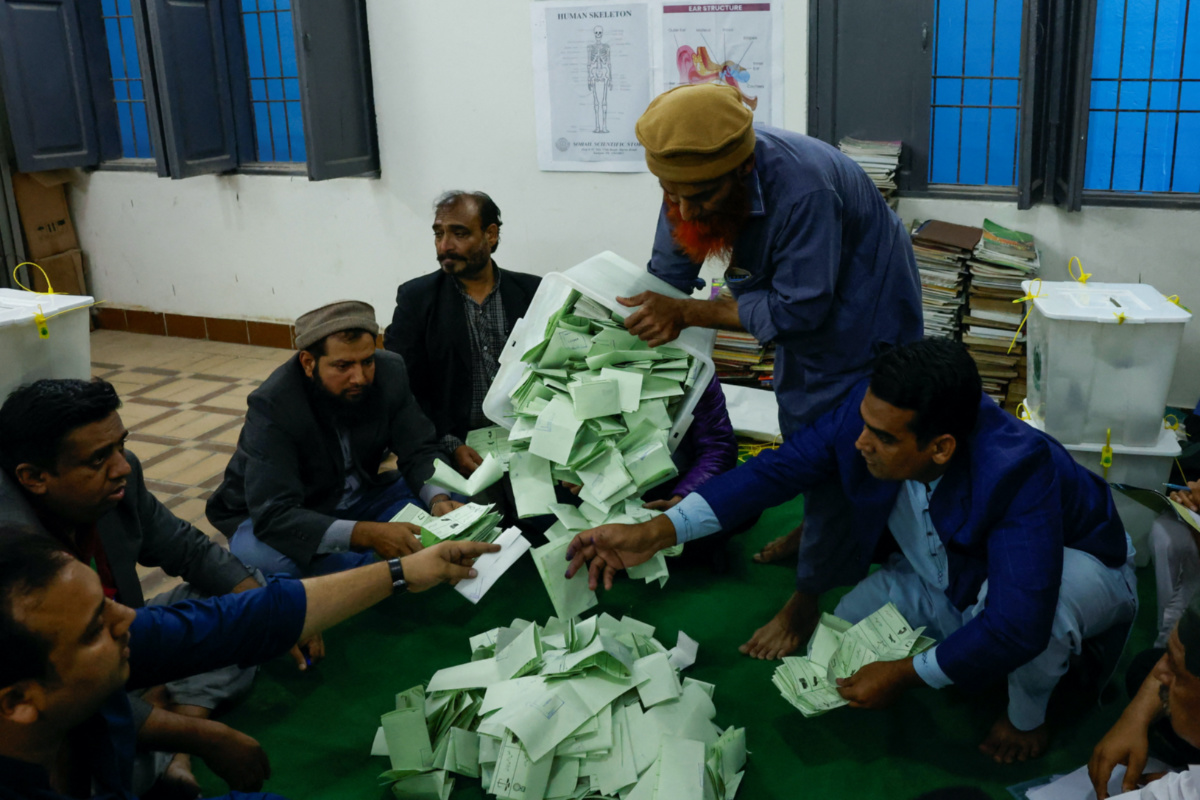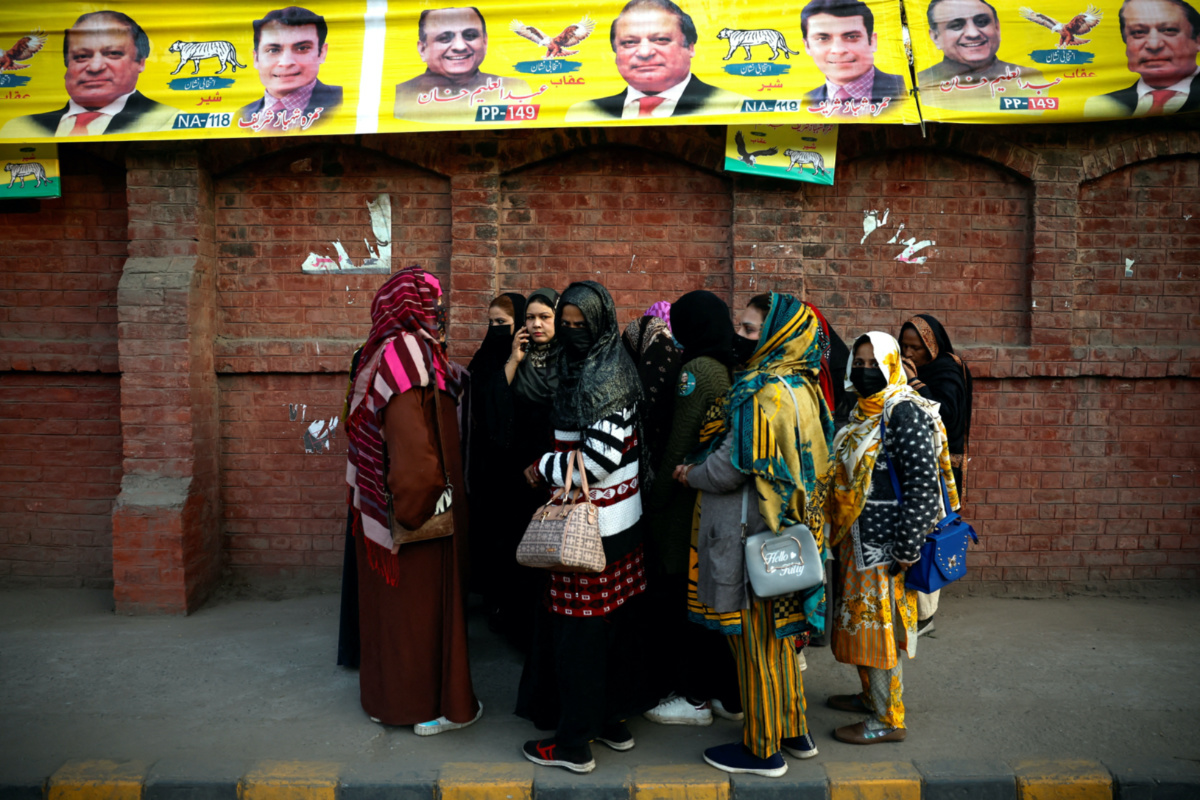Islamabad, Pakistan
Reuters
Pakistan counted votes after polling ended on Thursday in a general election marred by militant attacks and suspension of mobile phone services, with no indication of a clear leader seven hours after voting closed – an unusual delay compared to previous polls.
The South Asian country is struggling to recover from an economic crisis while it grapples with rising militant violence in a deeply polarised political environment.

Polling officers count ballot papers during the general election in Karachi, Pakistan on 8th February, 2024. PICTURE: Reuters/Akhtar Soomro
Projected results on all local television channels were unusually slow coming in. In previous elections, by midnight local time on election day, there was a clearer picture about which party had a substantial lead.
But most projections on television channels were below 20 per cent on each of the 265 seats contested. Pakistan’s Election Commission did not respond to a request for comment on an apparent delay in results.
The main contests are expected to be between candidates backed by jailed former Prime Minister Imran Khan, whose party won the last national election, and the Pakistan Muslim League of former Prime Minister Nawaz Sharif, who analysts say is being backed by the powerful military.
The national assembly has 265 seats and polling in one seat was postponed due to the death of a candidate. A party needs 133 seats for a simple majority but many analysts believe the vote may not produce a clear winner.
TV channels were expected to make projections of first results a few hours after voting closed at 5pm but there was no clear trend from the counting of paper ballots seven hours on.
With counting continuing through the night, a clear picture is likely to emerge early on Friday.
Sharif, considered by many analysts to be the front-runner, dismissed talk of an unclear result.
“Don’t talk about a coalition government. It is very important for a government to get a clear majority…It should not be relying on others,” he told reporters after casting his vote in the eastern city of Lahore.
Former cricket superstar Khan’s Pakistan Tehreek-e-Insaf (PTI) party, in a post on X, called on people to remove passwords from their personal Wifi accounts “so anyone in the vicinity” could have internet access.
Thousands of troops were deployed on the streets and at polling stations across the country and borders with Iran and Afghanistan were temporarily closed as security was stepped up to ensure peaceful polling.
Despite the heightened security, nine people, including two children, were killed in bomb blasts, grenade attacks and shootings.
At least 26 people were killed in two explosions near electoral candidates’ offices in the southwestern province of Balochistan on Wednesday. Islamic State later claimed responsibility for those attacks.
Thursday’s victims included five police killed in a bomb blast and firing on a patrol in the Kulachi area of Dera Ismail Khan district in the north-west, authorities said. Two children died in a blast outside a women’s polling station in Balochistan.
“Despite a few isolated incidents, the overall situation remained under control, demonstrating the effectiveness of our security measures,” caretaker Interior Minister Gohar Ejaz said in a statement.

A police officer walks past people standing in a queue to cast their vote outside a polling station during general election, in Peshawar, Pakistan, on 8th February, 2024. PICTUrE: Reuters/Fayaz Aziz
Mobile phone services suspended for security reasons were being partially resumed, the Interior Ministry said late on Thursday.
Washington was concerned about “steps that were taken to restrict freedom of expression, specifically around internet and cellphone use,” State Department deputy spokesperson Vedant Patel told reporters.
The US strongly condemned election-related violence both in the run-up to the polls and on election day, Patel added.
In spite of the security worries and bitter winter cold, people lined up at polling stations hours before voting was due to start. “The country is at stake, why should I come late?” said 86-year-old Mumtaz, a housewife a decade older than Pakistan itself as she queued up in Islamabad.
Caretaker Prime Minister Anwaar ul Haq Kakar said there had been high voter turnout in “a clear indication of public commitment to shaping the future of our country”.
We rely on our readers to fund Sight's work - become a financial supporter today!
For more information, head to our Subscriber's page.
Mobile networks
The move to suspend mobile networks sparked criticism from leaders of opposition parties, with the Pakistan Peoples Party’s Bilawal Bhutto Zardari, the 35-year-old son of assassinated former premier Benazir Bhutto, calling for its “immediate restoration”.
Amnesty International called it “a blunt attack on the rights to freedom of expression and peaceful assembly”.
Chief Election Commissioner Sikandar Sultan Raja said the decision on mobile networks was made by “law and order agencies” following Wednesday’s violence.

Women wait outside a polling station for voting to begin on the day of the general election, in Lahore, Pakistan on 8th February, 2024. PICTURE: Reuters/Navesh Chitrakar
The military has dominated the nuclear-armed country either directly or indirectly in its 76 years of independence but for several years it has maintained it does not interfere in politics.
“The deciding factor is which side the powerful military and its security agencies are on,” said Abbas Nasir, a columnist. “Only a huge turnout in favour of [Khan’s] PTI can change its fortunes.”
He added: “Economic challenges are so serious, grave, and the solutions so very painful that I am unsure how anyone who comes to power will steady the ship.”
If the election does not result in a clear majority for anyone, as analysts are predicting, tackling multiple challenges will be tricky – foremost being seeking a new bailout programme from the International Monetary Fund after the current arrangement expires in March.
– Reporting by GIBRAN PESHIMAM and CHARLOTTE GREENFIELD in Islamabad; MUSHTAQ ALI in Peshawar; SALIM AHMED in Quetta; and SAUD MEHSUD in Dera Ismail Khan; additional reporting by SIMON LEWIS in Washington DC, US.






